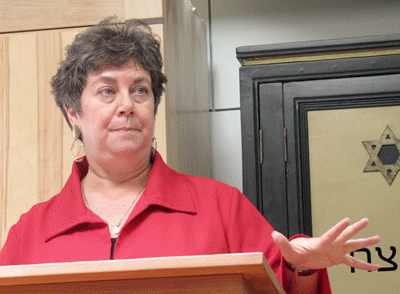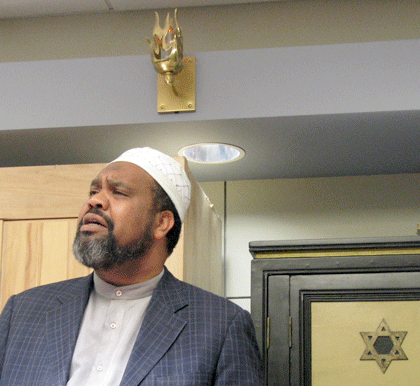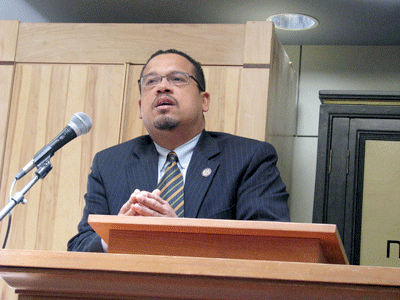In August 2010, a delegation of American Muslim scholars and spiritual leaders toured European concentration camps. The group of men and one woman had varying degrees of knowledge about the history of the Shoah going in. After their experience, they issued a statement that strongly denounced anti-Semitism and Holocaust denial.
One of the Muslim leaders on the death camp tour, Mohamed Magid, president of the Islamic Society of North America (ISNA) and imam and executive director of the All Dulles Area Muslim (ADAM) Society, recently visited the Twin Cities and spoke as part of a panel discussion on “Confronting Anti-Semitism and Religious Intolerance” at the Sabes JCC. The event was hosted by U.S. Rep. Keith Ellison and also featured Hannah Rosenthal, the U.S. Department of State’s special envoy to combat and monitor anti-Semitism.
Rosenthal, the daughter of a rabbi and Holocaust survivor, is the former executive director of the Jewish Council for Public Affairs. She also took part in the Muslim leaders’ tour last year.
Before their public event on May 18, Magid, Rosenthal and Ellison held a two-hour briefing for a small group of Jewish communal leaders and one reporter. It was an illuminating conversation.
At the outset, Rosenthal allowed that she was “happy to talk about Middle East peace, but it’s not my job.” In her current post, working for Secretary of State Hillary Rodham Clinton, Rosenthal has dealt with manifestations of anti-Semitism and its allied phenomenon, Holocaust denial, with an initial focus on Europe and Latin America. The deniers of the Shoah, she said, include “some people who claim to be scholars and historians.”
While the upsurge of Holocaust revisionism and “glorification” — parades with Waffen SS veterans in the Baltic states — is “very troublesome,” Rosenthal noted that there is “almost a tsunami of ultra-nationalism in Europe,” which targets the Roma (Gypsies) and immigrants. The rhetoric of these surging right-wing parties mimics that of the Jew haters of old, with its avowal “to protect our country’s purity.”
Rosenthal admitted that criticism of Israeli government policies is legitimate, but she applied what she called the “Sharansky” criteria, in reference to famed Soviet refusenik Natan Sharansky, to determine where such critiques cross over into anti-Semitism. There are three criteria to consider: when Israel is demonized (its leaders called “Nazis”); delegitimized, in policy discussions that conclude that “it shouldn’t exist”; and held to a different standard, such as in the case of 160 United Nations resolutions condemning Israeli conduct — regarding “the Sudan, which commits genocide, there have been five; North Korea, there have been eight,” she pointed out.
Rosenthal concluded in this regard: “There is an obsession in the United Nations with the State of Israel that can only be explained as either a mental disease, and therefore needs to be treated as such; or singling out and holding Israel to a different standard than you hold other countries, and therefore, it crosses the line from criticizing a sovereign state’s… policies, to criticizing the collective Jew.”
Imam Magid, who presides over a mega-mosque in suburban Washington, D.C., discussed the eye-opening tour of Auschwitz and Dachau. He told the Forward last year: “No Muslim in his right mind, female or male, should deny the Holocaust. When you walk the walk of the people who have been taken to be gassed, to be killed, how can a person deny physical evidence, something that’s beyond doubt?”
At the Sabes JCC briefing, Magid talked about what he saw at Auschwitz — “the ashes of people, the hair of people, the children’s clothes.” After seeing those things and imagining the hellish regime that reigned in that place, “you cannot be the same,” he said.
Magid talks about this experience in mosques (and he allowed that he gets some pushback at times); and he is developing a curriculum about the Holocaust for young Muslims. He wants to lead tours of Muslim and Jewish youth to Auschwitz and Bosnia. After visiting Auschwitz, Magid said that he no longer thinks about “giving a speech about bigotry; it’s giving a speech about saving life.” Magid is no marginal figure in the Muslim community; ISNA draws 40,000 attendees to its annual conferences.
Listening to Magid, I recalled that some Americans like to talk about how there are “no moderate Muslims” and Islam is an inherently flawed and violent religious ideology. Of course, there also are horribly violent passages in the Bible, and the history of Christianity is rather blood-soaked. Beyond that, it is unseemly for Jews who profess their love and staunch support for Israel to overreach and engage in bigoted arguments about Muslims and Islam.
Imam Magid, a native of Sudan who came to the U.S. in 1987, talked about the wonderful relations he has with rabbis in the nation’s capital; he said that when rabbis speak in his mosque, the members listen with rapt attention. I felt proud of my fellow Jews, as Magid testified about the warm interfaith relations that have been forged.
 Rep. Keith Ellison
Rep. Keith Ellison
Finally, I am also proud that the Minneapolis area is represented in Congress by Keith Ellison, who has demonstrated an abiding concern about the interests of the Jewish community, and hosted Hannah Rosenthal and Imam Mohamed Magid, who both bring a message of tolerance and hope in deeply troubled times.
— Mordecai Specktor / editor@ajwnews.com
(American Jewish World, 5.27.11)











 Rep. Keith Ellison
Rep. Keith Ellison









Comments 1